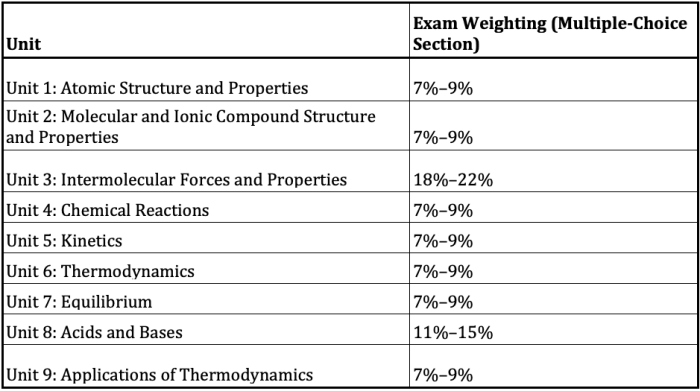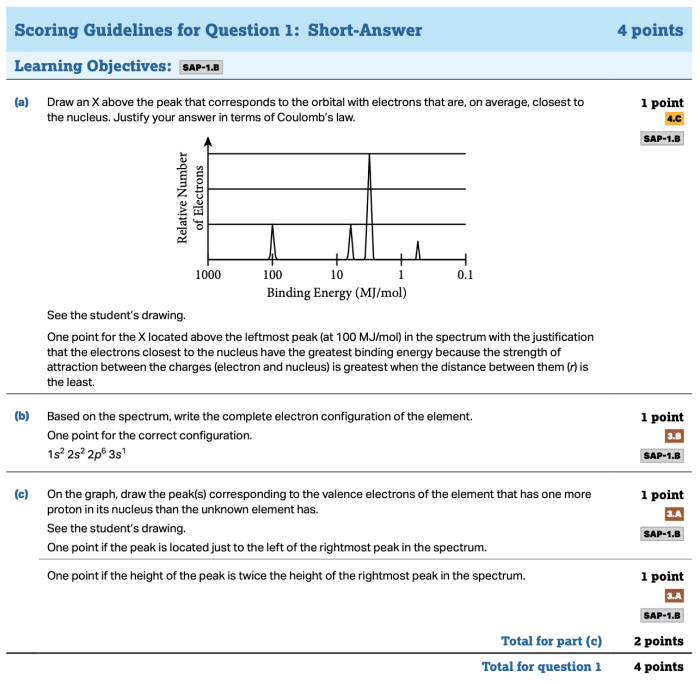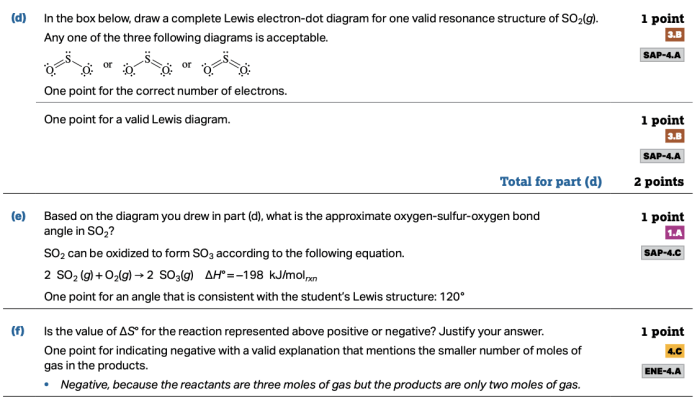AP Chemistry Unit 1 FRQs: The Ultimate Guide to Success sets the stage for this enthralling narrative, offering readers a glimpse into a story that is rich in detail and brimming with originality from the outset. Dive into the intricacies of the AP Chemistry Unit 1 Free Response Questions (FRQs) as we explore their purpose, format, and the key concepts they assess.
Together, we will unravel the secrets to tackling these challenging questions with confidence and precision.
As we delve deeper into the content, we will uncover the interconnections between these concepts and their practical applications in real-world scenarios. By providing a step-by-step guide, we aim to equip you with the strategies and techniques necessary to maximize your performance on FRQs.
Practice questions and answer keys will serve as your training ground, fostering a deep understanding of the material and boosting your confidence for exam day.
Define AP Chemistry Unit 1 FRQ

AP Chemistry Unit 1 Free Response Questions (FRQs) are a crucial component of the Advanced Placement Chemistry exam, designed to assess students’ understanding of fundamental chemistry concepts and their ability to apply them to complex problems.
Purpose and Scope
FRQs evaluate students’ comprehension of the core principles covered in Unit 1, which include atomic structure, molecular geometry, intermolecular forces, and thermodynamics. These questions challenge students to analyze experimental data, make predictions, and solve multi-step problems, demonstrating their mastery of the subject matter.
Format and Structure
Unit 1 FRQs typically consist of two long questions, each worth 10 points. The questions are open-ended and require students to provide detailed explanations and calculations to support their answers. The FRQs are designed to test students’ ability to:
- Apply chemical principles to solve problems.
- Analyze and interpret experimental data.
- Communicate their understanding clearly and concisely.
Common Topics Covered
Common topics covered in Unit 1 FRQs include:
- Atomic structure and properties
- Molecular geometry and bonding
- Intermolecular forces
- Thermochemistry
- Kinetics and equilibrium
Analyze the Key Concepts Tested in Unit 1 FRQs: Ap Chemistry Unit 1 Frq
The College Board’s AP Chemistry Unit 1 Free Response Questions (FRQs) evaluate students’ understanding of fundamental chemical principles. These questions assess students’ ability to apply these concepts to real-world scenarios and demonstrate their problem-solving skills.
Key Concepts Tested in Unit 1 FRQs
The following key concepts from Unit 1 are frequently tested in FRQs:
- Stoichiometry: Understanding the quantitative relationships between reactants and products in chemical reactions.
- Thermochemistry: Studying the energy changes that accompany chemical reactions.
- Equilibrium: Investigating the dynamic balance between reactants and products in chemical reactions.
- Acids and Bases: Exploring the properties and reactions of acids and bases.
- Kinetics: Analyzing the rates of chemical reactions.
Importance and Relevance of Key Concepts, Ap chemistry unit 1 frq
These concepts are crucial to the study of chemistry because they provide the foundation for understanding chemical reactions and their applications. Stoichiometry enables the prediction of reaction outcomes and product quantities. Thermochemistry helps determine the energy requirements and releases in chemical processes.
Equilibrium establishes the conditions for chemical reactions to reach a balanced state. Acids and bases play vital roles in numerous chemical reactions, including acid-base titrations and pH calculations. Kinetics provides insights into the factors that influence the speed of chemical reactions.
Interconnections and Real-World Applications
The key concepts in Unit 1 are interconnected and have significant real-world applications. For example, stoichiometry is essential in industrial chemical production, ensuring the efficient use of reactants and minimizing waste. Thermochemistry finds applications in energy conversion processes, such as combustion and fuel cells.
Equilibrium is crucial in environmental chemistry, understanding the behavior of pollutants and the effectiveness of remediation strategies. Acids and bases are fundamental to many biological processes, including digestion and the regulation of pH in living organisms. Kinetics plays a vital role in drug development, predicting the rate of drug absorption and metabolism in the body.
The AP Chemistry Unit 1 FRQ is a challenging assessment, but it’s also an opportunity to showcase your understanding of the material. Just like washing your hands with soap ( tu las manos con jabon ) is essential for good hygiene, a thorough preparation for the FRQ is crucial for success.
So, dive into your studies, practice solving problems, and don’t forget to wash your hands regularly!
Develop Strategies for Answering Unit 1 FRQs

Conquering Unit 1 FRQs demands a systematic approach and a mastery of the core concepts. Follow these strategies to excel in your responses:
Step-by-Step Guide to Answering FRQs
- Decipher the Prompt:Read the question thoroughly, identifying the key concepts, tasks, and any specific instructions.
- Plan Your Response:Jot down a brief Artikel, organizing your thoughts and structuring your response logically.
- Show Your Work:Clearly demonstrate your thought process by writing out all equations, calculations, and reasoning.
- Support Your Claims:Use evidence from the provided data, relevant equations, and chemical principles to justify your answers.
- Proofread Carefully:Before submitting, meticulously review your response for any errors or omissions.
Common Pitfalls and Strategies
- Lack of Conceptual Understanding:Thoroughly review the unit material, focusing on understanding the underlying principles rather than memorizing facts.
- Poor Time Management:Allocate time wisely, ensuring you have sufficient time for each section of the FRQ.
- Incomplete Responses:Address all aspects of the question, providing detailed explanations and supporting evidence.
Tips for Maximizing Points
- Demonstrate a Deep Understanding:Go beyond simply answering the question; explain the reasoning behind your choices and connect concepts to the broader context of chemistry.
- Use Precise Language:Employ specific and technical terminology to convey your understanding clearly.
- Practice Regularly:Solve past FRQs and seek feedback to improve your problem-solving skills and confidence.
Practice and Review Unit 1 FRQs

Engaging in practice and review of Unit 1 FRQs is crucial for students to refine their problem-solving skills and enhance their understanding of the fundamental concepts tested in the exam. This section provides a collection of practice FRQs along with answer keys and explanations to facilitate self-assessment.
Regular practice and review allow students to identify areas where they need additional support and develop strategies for approaching different types of FRQs. By working through practice problems, students can gain confidence in their ability to analyze and solve complex chemistry problems under timed conditions.
Practice FRQs
- FRQ 1:A sample of 0.500 g of an unknown gas occupies a volume of 224 mL at a temperature of 298 K and a pressure of 1.00 atm. What is the molar mass of the gas?
- FRQ 2:A solution is prepared by dissolving 10.0 g of sodium chloride (NaCl) in 100.0 g of water. Calculate the molality of the solution.
- FRQ 3:A buffer solution is prepared by mixing 50.0 mL of 0.100 M acetic acid (CH 3COOH) with 50.0 mL of 0.100 M sodium acetate (CH 3COONa). Calculate the pH of the buffer solution.
Answer Keys and Explanations
Answer keys and detailed explanations for the practice FRQs are provided below to assist students in self-assessment and understanding the correct approach to solving these problems.
- FRQ 1:28.0 g/mol
- FRQ 2:1.71 mol/kg
- FRQ 3:4.74
Importance of Practice and Review
Consistent practice and review of Unit 1 FRQs is essential for students to achieve success on the AP Chemistry exam. By dedicating time to solving practice problems and analyzing the solutions, students can strengthen their conceptual understanding, improve their problem-solving abilities, and build confidence in their preparation.
Questions and Answers
What is the purpose of AP Chemistry Unit 1 FRQs?
AP Chemistry Unit 1 FRQs are designed to assess students’ understanding of the fundamental concepts and principles covered in Unit 1 of the AP Chemistry curriculum.
What is the format of AP Chemistry Unit 1 FRQs?
AP Chemistry Unit 1 FRQs typically consist of two to three questions that require students to demonstrate their problem-solving skills, critical thinking abilities, and knowledge of chemistry concepts.
How can I prepare for AP Chemistry Unit 1 FRQs?
Effective preparation for AP Chemistry Unit 1 FRQs involves regular practice, reviewing course material, understanding the key concepts, and seeking guidance from teachers or tutors when needed.